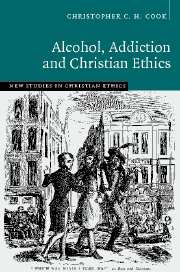Book contents
- Frontmatter
- Contents
- General editor's preface
- Preface
- 1 Alcohol, addiction and Christian ethics: introduction
- 2 An addiction in context: the use, misuse and harmful use of alcohol
- 3 Drunkenness as vice in the New Testament
- 4 Drunkenness as intemperance: Augustine, Aquinas, Luther and Whitefield
- 5 Temperance redefined: the nineteenth-century temperance movement
- 6 Addiction as sin and syndrome: the divided self
- 7 Alcohol, addiction and Christian ethics
- 8 Conclusions
- Bibliography
- Index of Bible references
- Index of names and subjects
7 - Alcohol, addiction and Christian ethics
Published online by Cambridge University Press: 22 September 2009
- Frontmatter
- Contents
- General editor's preface
- Preface
- 1 Alcohol, addiction and Christian ethics: introduction
- 2 An addiction in context: the use, misuse and harmful use of alcohol
- 3 Drunkenness as vice in the New Testament
- 4 Drunkenness as intemperance: Augustine, Aquinas, Luther and Whitefield
- 5 Temperance redefined: the nineteenth-century temperance movement
- 6 Addiction as sin and syndrome: the divided self
- 7 Alcohol, addiction and Christian ethics
- 8 Conclusions
- Bibliography
- Index of Bible references
- Index of names and subjects
Summary
I hope that the previous six chapters will not have left the reader in any doubt concerning the serious nature of the actual and potential harms that alcohol has presented, and continues to present, to individuals and society. These harms, especially in recent years, have often been presented primarily and pragmatically as a challenge to health care and public policy, and there is no doubt that they do indeed offer a very major challenge to clinicians, researchers and policy-makers. But what is the ethical and theological nature of this challenge? And do the Christian resources of scripture, tradition and theological reason that have been explored in the earlier chapters of this book offer us a valuable resource for a contemporary response to this challenge?
In this chapter, I will attempt to employ the conclusions and implications of previous chapters in order that they might inform a theological model of alcohol use and addiction which is both scientifically informed and ethically informative. In support of this endeavour, a number of considerations arising from the earlier chapters of the book might helpfully be identified at the outset:
Social and scientific constructions of addiction have historically been subject to change. While modern scientific understandings of addiction might with good reason be considered better, and more objectively evidence-based, than those that have gone before, we do not know what future scientific research will reveal. Furthermore, a plurality of concepts of addiction is in operation in the world today.
It is clear that alcohol ‘misuse’, addiction and other alcohol-related harms cannot be treated completely separately from social and (apparently) harm-free alcohol use by individuals and groups.[…]
- Type
- Chapter
- Information
- Alcohol, Addiction and Christian Ethics , pp. 171 - 196Publisher: Cambridge University PressPrint publication year: 2006

